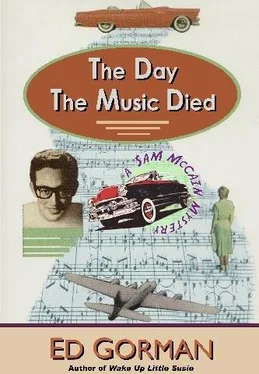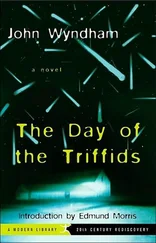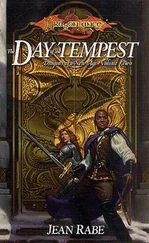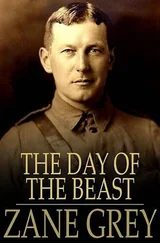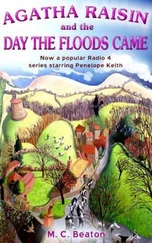Ed Gorman - The Day The Music Died
Здесь есть возможность читать онлайн «Ed Gorman - The Day The Music Died» весь текст электронной книги совершенно бесплатно (целиком полную версию без сокращений). В некоторых случаях можно слушать аудио, скачать через торрент в формате fb2 и присутствует краткое содержание. Жанр: Криминальный детектив, на английском языке. Описание произведения, (предисловие) а так же отзывы посетителей доступны на портале библиотеки ЛибКат.
- Название:The Day The Music Died
- Автор:
- Жанр:
- Год:неизвестен
- ISBN:нет данных
- Рейтинг книги:3 / 5. Голосов: 1
-
Избранное:Добавить в избранное
- Отзывы:
-
Ваша оценка:
- 60
- 1
- 2
- 3
- 4
- 5
The Day The Music Died: краткое содержание, описание и аннотация
Предлагаем к чтению аннотацию, описание, краткое содержание или предисловие (зависит от того, что написал сам автор книги «The Day The Music Died»). Если вы не нашли необходимую информацию о книге — напишите в комментариях, мы постараемся отыскать её.
The Day The Music Died — читать онлайн бесплатно полную книгу (весь текст) целиком
Ниже представлен текст книги, разбитый по страницам. Система сохранения места последней прочитанной страницы, позволяет с удобством читать онлайн бесплатно книгу «The Day The Music Died», без необходимости каждый раз заново искать на чём Вы остановились. Поставьте закладку, и сможете в любой момент перейти на страницу, на которой закончили чтение.
Интервал:
Закладка:
“Like what?”
“I’m not sure. They just both said they could probably come up with something.”
“God, Ruthie, didn’t you hear what happened to the girl they found last night?”
“Oh, I heard, all right. But it was obviously somebody who didn’t know what he was doing.”
“You shouldn’t let anybody except a doctor touch you.”
“It doesn’t have to be a doctor. It’s not a tough thing to do if you know what you’re doing.”
“You’re scaring the hell out of me, Ruthie.”
“My life’s over if I have this baby.”
“I know, Ruthie. But still-”
“Here we are.”
I pulled over to the curb. Sheen’s Fashion Fountain was the most expensive woman’s apparel shop in town. It was where you bought your girlfriend a gift if it was her birthday or if you’d really, really pissed her off.
She opened the door right away. I had one of those moments when she didn’t look familiar.
Her fear and grief had made her a stranger.
I reached over and touched her cheek. “I love you, Ruthie. You know that. I wish you’d let me help you.”
“I did this to myself. It’s my responsibility.”
“You need a ride home tonight?”
“I can ride with Betty.”
Betty was one of the older clerks. She drove to work and lived about two blocks from Mom and Dad.
“I know some people in Cedar Rapids,”
I said. “They may know a doctor there.”
She leaned over and returned my cheek kiss.
“Thanks. But let me see what my friends come up with first, all right?”
“Just please let me know what’s going on.”
“I promise.”
She got out of the car. I sat there in gloom, gray and cold as the overcast afternoon itself. Then a car horn blasted me. I was in a No Parking Zone and holding up traffic.
Twenty-two
Maggie Yates lived above a double garage on the grounds of a burned-out mansion. One of the servants had lived in the garage during the better days of the manse. Now it was rented out as an apartment. Maggie’s bike lay against the wooden steps leading up the side of the garage and Miles Davis’ music painted everything a brooding dusky color. I had to knock a couple of times in order for her to hear me above the music.
Maggie was dressed in black. Black turtleneck, black jeans, black socks.
Her long red hair was, as always, a lovely Celtic mess and her Audrey Hepburn face was, also as always, a lovely Celtic mess of winsomeness and melancholy.
The walls behind her told the story.
Photographs of Albert Camus, Jack
Kerouac, James Dean, Charlie Parker and Eleanor Roosevelt covered one wall, while album covers of Gil Evans, Jerry
Mulligan, Odetta and Dave Brubeck covered another.
Maggie was the town’s resident beatnik. She was somewhere in her early thirties, had graduated from the University of Iowa and was holing up here, she said, so she could write her novel. A lot of times I’d pull up outside and I could hear her banging away on the portable typewriter that sits on the table next to a large window overlooking what used to be a duck pond. As yet, she hasn’t let me see as much as a paragraph of the book. But she keeps promising that I’ll be the first to read it.
She said, “C’mon in. But I better warn you, McCain. My period started today. And you know I just don’t like to do it when I’m menstruating.”
I tried my best to sound hurt. “You think the only reason I come over here is for sex?”
“Sure,” she said. “And that’s the only reason I let you in. I mean, I get my jollies, and you do, too.”
I guess this was the brave new world Hugh Hefner talks about all the time. You know, frank and open discussions between the sexes about so-e-it. In some ways, I like it. It’s nice coming over here and spending a couple of hours in Maggie’s bed and then just leaving and going back to my own little world. I usually make it over here once or twice a week. She has a great body. She says I’m the only “civilized” person in town except for Judge Whitney, whom she says is a “fascist.” That’s why she sleeps with me, she says, me not being one, a dope or, two, a redneck. She won’t accept compliments or anything remotely like affection. One time I said to her, “You really are beautiful, Maggie.” She said, “Can the crapola, McCain. You’re here because you need sex. That’s all that’s going on here.”
I always felt cheated. I want to say lovey-dovey stuff, maybe for my sake as much as hers. The lovey-dovey stuff is nice to say even if you don’t mean it-or sometimes even if it’s being said to you and you know she doesn’t mean it. It’s like having a smoke afterward.
She said now, “I’m in sort of a hurry.
Pete Seeger’s in Iowa City tonight. I was just getting ready. My ride should be here any time.”
I tried very hard not to look at the sweet smooth curves of that body packed into the black sweater and black jeans. Why not combine a little sex with detection? Hadn’t Mike Hammer shown us the way?
The apartment consisted of a large living room that looked surprisingly middle-class given all the jazz musicians and literary heroes on the walls; a small bedroom with a very comfortable double bed and a kitchen and bathroom big enough for only one person at a time.
“I didn’t know you hung out with Susan Frazier,” I said.
She was opening her purse, checking her billfold for money. “Oh, I never really “hung out” with her. She was interested in art so we went to Leopold Bloom’s a few times and I explained Picasso and Chagall and Van Gogh to her. I mean, not that I know all that much myself. God, the guy that runs that store is such a pretentious asshole. You ever notice that?”
“No, I never did,” I said deadpan.
“He’s one of my favorite people.”
She whipped her head up and giggled at me.
“McCain, you’re a certified nut, you know that?”
Now, she was at the closet, digging out a heavy coat.
I said, “You know much about her personal life?”
She put her coat on. Looked at herself in a mirror by the door. “What’re you going to do tonight, McCain? Stay home and watch Father Knows Best?”
I’d made the mistake of telling her that Tv shows like that were necessary to society because, corny as they were, they gave us a sense of right and wrong. I believed that. She didn’t.
A car horn sounded.
“My ride,” she said. “Gotta hurry.”
“Hey,” I said. “Just one question.”
“I really am in a hurry, McCain,” she said, grabbing her purse from the coffee table.
“She ever tell you she was in any kind of trouble?”
“Just once,” she said, as she opened the door and ushered me out onto the tiny porch.
“What’d she say?”
As she was locking the door from the outside, she said, “She called one night pretty drunk and said it was going to be all over town very soon.”
“What was?”
Maggie turned and faced me. “She never got around to telling me. She passed out. She couldn’t drink worth a damn.”
Then I was following her down the stairs two steps at a time, asking her a few more questions.
I half ran after her to the waiting car.
Inside was a slim, balding guy who wore sunglasses and a black turtleneck. I hadn’t known that Maggie was dating vampires, but I was happy for her. A mordant jazz song could be heard when she opened the door and slid inside. Then song, Maggie and vampire were gone.
I sat in the library until five-thirty. Every ten minutes or so I’d go over and try Debbie Lundigan’s phone number. I wanted to find out if Susan Whitney had ever talked to her about the blackmail. There was no answer.
I finally gave up on the phone and drove over there. Debbie lived in an old house that had been converted into two apartments, one up, one down.
Читать дальшеИнтервал:
Закладка:
Похожие книги на «The Day The Music Died»
Представляем Вашему вниманию похожие книги на «The Day The Music Died» списком для выбора. Мы отобрали схожую по названию и смыслу литературу в надежде предоставить читателям больше вариантов отыскать новые, интересные, ещё непрочитанные произведения.
Обсуждение, отзывы о книге «The Day The Music Died» и просто собственные мнения читателей. Оставьте ваши комментарии, напишите, что Вы думаете о произведении, его смысле или главных героях. Укажите что конкретно понравилось, а что нет, и почему Вы так считаете.
